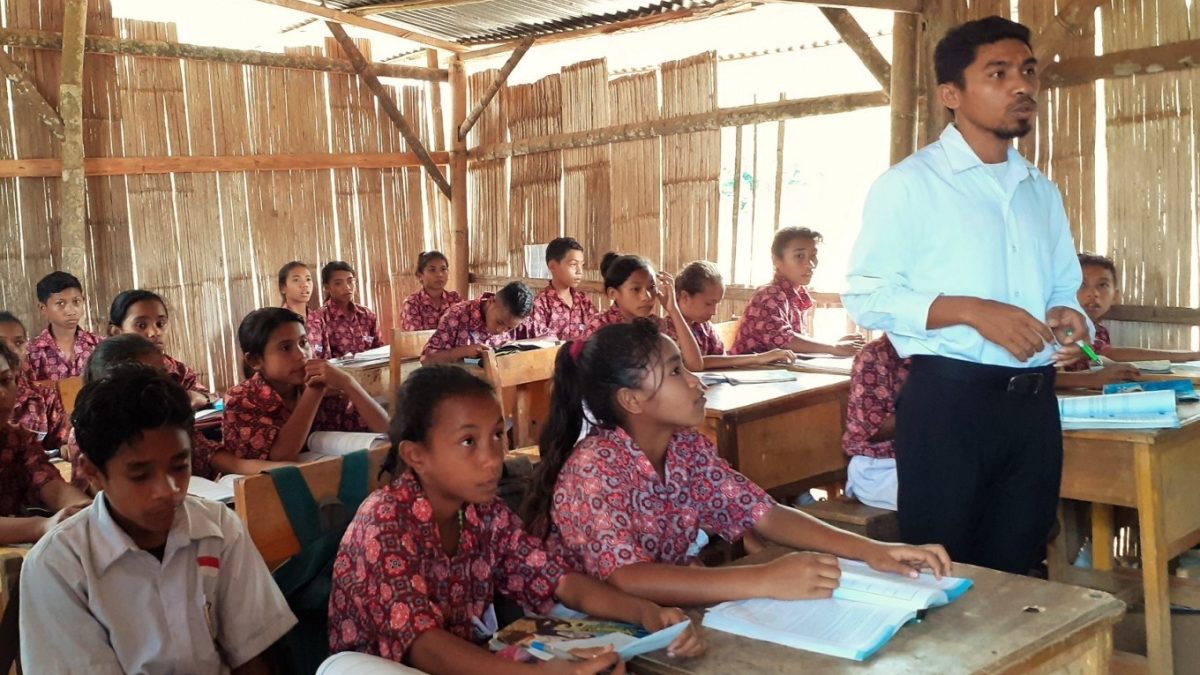The Importance of Education as an Effort to Improve Access and Quality of Public Knowledge

Students study in their classroom in SMPN 10 junior high school in Gulung hamlet, Ruan village, East Manggarai, East Nusa Tenggara (Photo Credit : Markus Makur)
Education is one of the pillars in SDGs number 4 in the effort to build an advanced and prosperous nation. However, in many regions of Indonesia, especially at the local level, access to quality education remains a significant challenge. This is due to various factors such as geographical disparities, availability of teachers, lack of facilities and infrastructure, economic inequalities, uneven learning curricula, education budget allocation, teachers' administrative burdens, limited access to technology, minimal support for inclusive education, and inconsistent policy changes. Therefore, collective efforts are needed to not only improve access to formal education but also to support informal education and enhance education that is relevant to local needs and conditions.
Improving Access and Quality of Formal Education
From the explanation above, several steps can be taken to address these challenges:
- Development of Educational Infrastructure and Access to Technology
The development and improvement of educational infrastructure in remote areas should be a priority. Many schools, especially in rural areas, lack basic facilities such as proper classrooms, libraries, laboratories, and internet access. This limits students' ability to learn effectively and reduces the opportunity to develop the necessary skills. All stakeholders should collaborate to ensure that all children have access to a proper learning environment.
- Improvement of Teacher Quality through Training and Professional Development Programs for Teachers in Remote Areas
Qualified and motivated teachers are key to producing quality students. In addition, incentives to attract the best teachers to the areas that need them can be a long-term solution.
- Scholarship Programs and Budget Support for Education in Remote Areas
There needs to be a fair allocation of budgets across all regions. Many schools still lack operational and maintenance budgets. Meanwhile, many children in remote areas cannot continue their education due to financial constraints, so revitalizing scholarship programs and targeted financial support can help them stay in school and pursue higher education.
- Policy Changes that in some cases add to the workload of teachers, thereby limiting the time that should be used to develop teaching skills and interact with students.
Enhancing and Supporting Informal Education and the Development of Local Knowledge
Informal education and traditional knowledge play an important role in enriching the insights and skills of local communities, as well as supporting formal education. Informal education and traditional knowledge can be promoted by:
- Empowerment of Local Communities
This type of informal education is fully organized by local communities, such as skills courses, study groups, or arts and cultural activities. This should be supported by the government and non-governmental organizations by providing resources and facilitators to develop the preservation and inheritance of local potentials as well as strengthen the programs implemented.
- Recognition for Individuals Who Have Preserved Local Potentials from Generation to Generation as Valuable Assets that Need to be Protected and Preserved
Programs for the development of community knowledge should be carried out through education that integrates local knowledge, such as agricultural practices, the development of traditional medicine, the preservation of arts and culture, local activities in environmental protection including other local wisdom, so that this can help communities understand and utilize their resources more effectively and create a greater sense of ownership over their region.
- Collaboration between Formal and Informal Education by Incorporating Traditional Knowledge and Skills into the Educational Curriculum
This will not only enrich the curriculum but also ensure that the education provided is relevant to the local context. Improving access and the quality of education at the local level is not an easy task. It requires commitment from various parties, including the government, the private sector, educational institutions, and local communities themselves. In the process, it is necessary to consider the challenges and dynamics that may hinder progress, such as urbanization, climate change, and globalization, which may affect the needs, behaviors, and conditions of local communities. However, with proper planning, strong collaboration and cooperation, efforts to improve access to information and technology, and a drive to achieve quality education along with support for informal education and traditional knowledge can be realized. This will not only enhance the economic, social, and cultural well-being of local communities but also serve as a strong foundation in building a more empowered, dignified, and sustainable nation. By continually working to improve access and quality of education at the local level, as well as supporting informal education and the preservation of traditional knowledge, a smart, empowered, harmonious, and environmentally responsible society can be created for future sustainability. This is a long-term investment that can provide significant benefits and opportunities for future generations. Additionally, stakeholders and the government must be able to ensure the quality of education inclusively and comprehensively, reaching all communities by enhancing access to learning opportunities for all citizens throughout their lives.
-Diana Anggraeni

